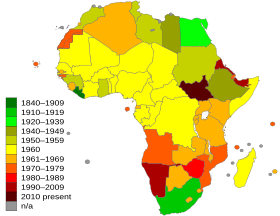
The postcolonial history of Africa spans the postcolonial, neocolonial, and contemporary period in the history of Africa. The decolonization of Africa started with Libya in 1951, although Liberia, South Africa, Egypt and Ethiopia were already independent. Many countries followed in the 1950s and 1960s, with a peak in 1960 with the Year of Africa, which saw 17 African nations declare independence, including a large part of French West Africa. Most of the remaining countries gained independence throughout the 1960s, although some colonizers (Portugal in particular) were reluctant to relinquish sovereignty, resulting in bitter wars of independence which lasted for a decade or more. The last African countries to gain formal independence were Guinea-Bissau (1974), Mozambique (1975) and Angola (1975) from Portugal; Djibouti from France in 1977; Zimbabwe from the United Kingdom in 1980; and Namibia from South Africa in 1990. Eritrea later split off from Ethiopia in 1993.[1]
- ^ Henry S. Wilson, African decolonization (E. Arnold, 1994).